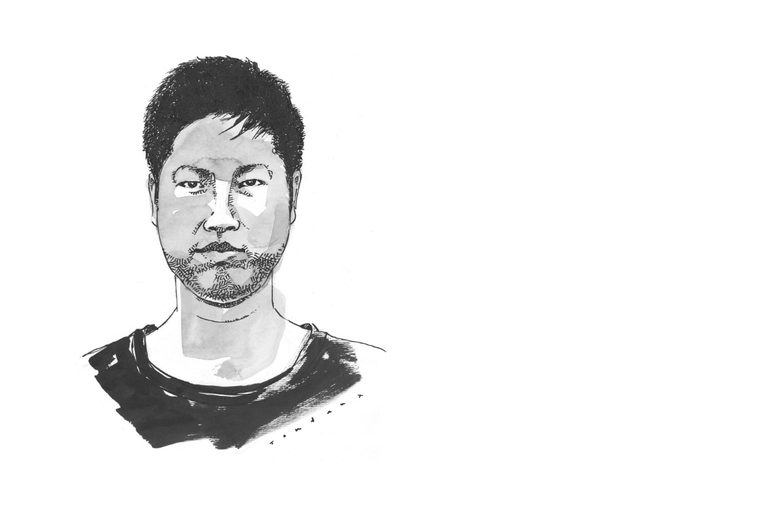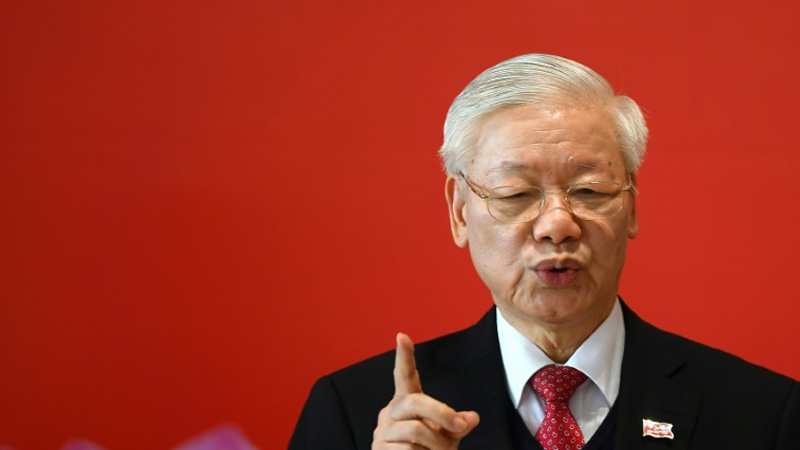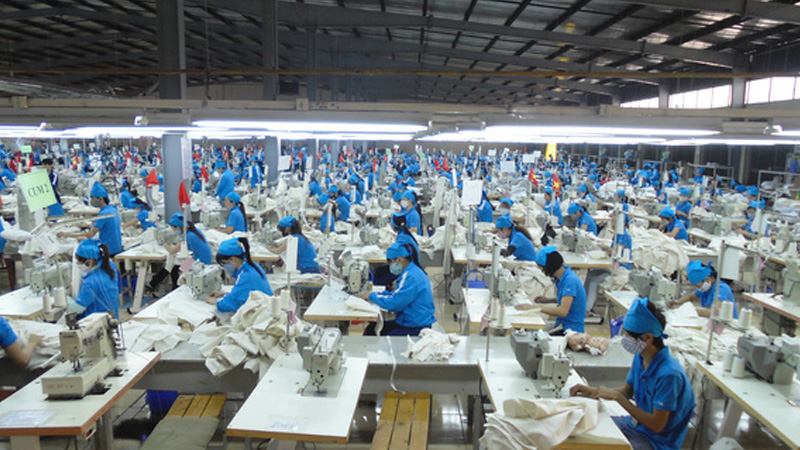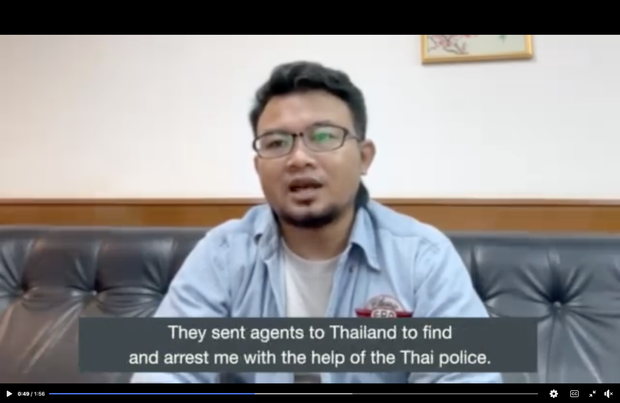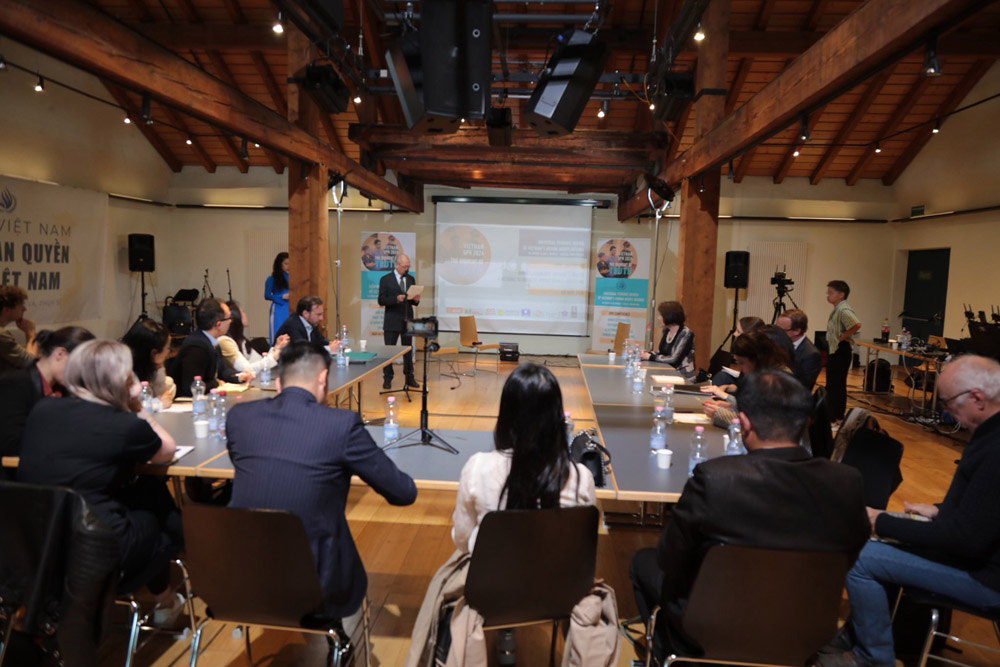As the tropical dawn breaks in Duong Noi just outside Hanoi on 24 June 2020, Trinh Ba Phuong is at home with his wife, small son and newborn baby. But he is not sleeping. This land rights activist and crab farmer is live streaming video on social media:
“Uniformed and 23 plainclothes police have surrounded my house,” he says. “I believe they are going to arrest me today.”
Then there is the loud metallic crack of the lock on the door of the family’s home being broken before Phuong is forcibly removed.
Simultaneously his mother, Can Thi Theu, and younger brother, Trinh Ba Tu – also human rights defenders – are detained 70 km from Hanoi. During his arrest, Tu is badly beaten.
The brothers had anticipated their detention – or worse. They pre-recorded videos asking supporters to publicly display their bodies if they were killed so that crimes against them would be exposed. They survived, but two years later, these three members of Vietnam’s most prominent and courageous family of land rights campaigners remain incarcerated – convicted because they questioned the authorities’ version of events in a bloody clash in the community of Dong Tam.
The Dong Tam conflict
Residents of Dong Tam opposed the appropriation of 50 hectares of their land by the government. Early on the morning of 9 January 2020, around 3,000 State security personnel arrived in the village to ensure the confiscation continued smoothly. The confrontation that followed left four people dead – one of the village elders who led resistance to the land grab and three police officers.
The authorities blamed the violence on local rioters. Can Thi Theu and her two sons were not in Dong Tam that day, but after hearing testimony from witnesses, they were among the authors of a report claiming the police had attacked first. All three land activists were convicted under Article 117 of Vietnam’s penal code, which prohibits ‘making, storing, disseminating or propagandising information… that aims to oppose the State’. It is a law widely used in Vietnam to quash dissent and imprison protesters.
In May 2021, Theu and her youngest son were sentenced to eight years in prison. She is no stranger to life behind bars – she has been jailed repeatedly for her land activism.
This was not the life Theu had imagined. She and her husband worked hard but happily, producing rice and farming fish in Duong Noi. Then their land was requisitioned, with a derisory offer of financial compensation. In communist Vietnam, all land is owned by the State, so the government can technically use what it wants. But families like Theu’s have often tilled the same soil for generations. And in her case, it was not only the fields that were taken. The compulsory purchase included the graves of their ancestors.
Peaceful activism
Committed to the principle of non-violent protest, Theu began writing to the authorities asking for the land back – or at least, a proper price for it. She learned of other land disputes, filmed and publicised them, and began to be harassed by the Vietnamese authorities. Her first stint in prison, along with her husband, was in 2014.
But this time, her daughter, Trinh Thi Thao, is far more concerned. She has only recently been allowed to visit her mum after almost two years in prison. Theu is nearly 60 now and less resilient. Meanwhile, her sons Trinh Ba Tu and Trinh Ba Phuong have been moved to distant prisons.
Concern for the two brothers
Trinh Ba Tu’s family fear for his fate. He hasn’t called home since he told his father that prison officers beat and foot shackled him during the ten days he was placed in a disciplinary cell in September 2022. He has started a hunger strike, but the authorities refuse to inform the family about his health condition.
As for Trinh Ba Phuong, he has been subjected to torture and ill-treatment throughout the investigation into his case. He has been physically abused, and in March 2021, he was detained in a tiny space within a psychiatric ward where his weight dropped by 10kg.
In December 2021, Trinh Ba Phuong was sentenced to 10 years in prison. His father and his wife, Do Thi Thu, were physically prevented from attending the trial and were not informed when Phuong was transferred to a prison 1,000 km away from his home in late September 2022. While Do Thi Thu tells their oldest son that his dad is away working, she has been allowed to visit her husband only three times. This makes Do Thi Thu extremely anxious.
“I had a message that Phuong wants to see me. I just keep thinking something really bad has happened. That’s what I worry about most – that he’s tortured, and I wouldn’t know about it.”
In a video recording made just before his detention, Phuong looks calmly and directly into the camera.
“If they arrest me now, I have no regrets,” he said.
Phuong talked about how his parents’ commitment to non-violence influenced his own land activism.
“No matter how they hit me, I didn’t respond. Once you accept to fight this way, you must accept all the pain it brings. To prepare mentally for something like that isn’t very easy, but because my parents have overcome that, it gives me confidence.”
Before Phuong was sentenced in December, he spoke courageously in court.
“I’m fighting so that no piece of land in our country will ever be stolen, so that no one will have to leave the country to earn their living as a guest worker,” he said.
Join our call to release Can Thi Theu and her sons, Trinh Ba Phuong and Trinh Ba Tu.
View the official article on the World Organisation Against Torture website by clicking here.

